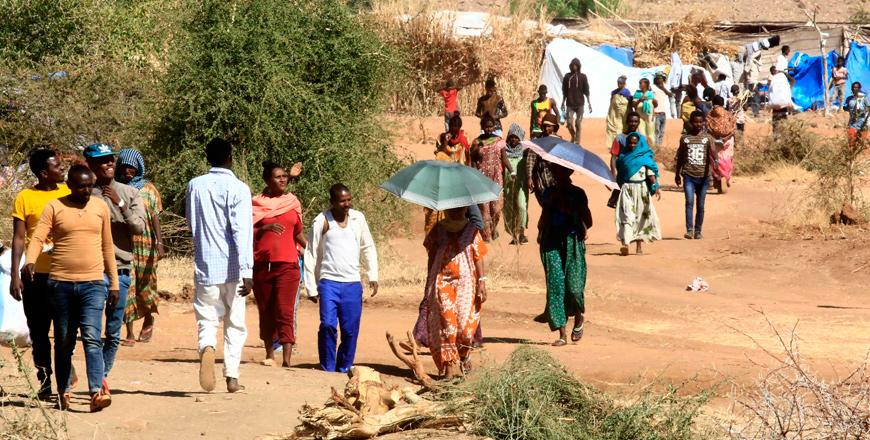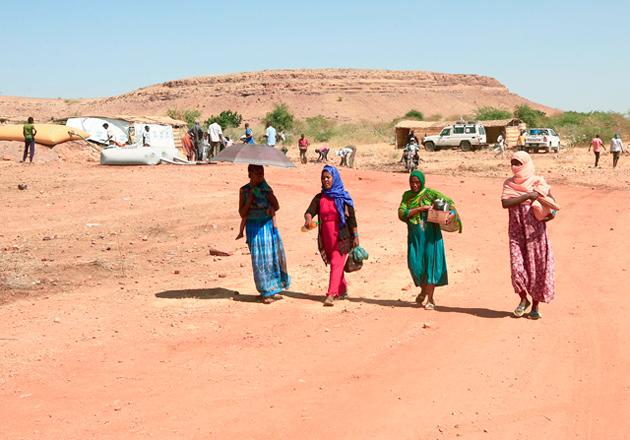You are here
Poverty-hit Sudan struggles with Ethiopia refugee influx
By AFP - Nov 25,2020 - Last updated at Nov 25,2020
KHARTOUM — As Ethiopia’s conflict rages on, tens of thousands of refugees have crossed the border into one of the most impoverished regions of Sudan, which itself is one of the world’s poorest countries.
Khartoum has done its best to shelter them at a time it is seeking to transition to a stable democratic era while battling economic crisis and poverty deepened by the COVID-19 pandemic.
Analysts and international aid agencies warn that Sudan now urgently needs assistance in order to be able to help those desperately fleeing Ethiopia.
“A larger influx would have very dangerous economic repercussions for Sudan,” said Sudanese Economist Mohamed El Nayer.
“We need the international community to urgently intervene economically and help provide food, shelter and medicines to those refugees. If not, Sudan’s economy will be over-burdened.”
More than 40,000 refugees have crossed from Ethiopia into Sudan since the conflict broke out on November 4 between federal forces and leaders of Tigray’s ruling party.
The refugees have since settled in vast and unhygenic desert camps in remote eastern Sudan that still lack proper provision of water, food and sanitary facilities.
“The numbers are way above the state’s capabilities,” Gedaref state governor Soliman Ali told AFP. “And a rise in numbers will put further pressure not only on the state but all of Sudan.
“Since the beginning of the crisis, the response of aid groups has been weak, and not on par with the magnitude of the crisis at hand.”
Mass influx,
rapid inflation
Inhabitants of Hamdayit, a border town in Kassala state, which has hosted more than 28,000 refugees, say the surging demand from the influx has rapidly driven up market prices.
“We already suffer scarcity of resources like flour, fuel and other commodities,” said Gedaref Governor Ali. “But now, with the ongoing refugee crisis, Gedaref’s share of these goods is further strained.”
The crisis comes with Sudan in the middle of a fragile transition since the April 2019 ouster of veteran strongman Omar Al Bashir, after unprecedented mass protests against his rule.
A joint civilian-military government has tried to rebuild the economy, which has been decimated by decades of US sanctions, government mismanagement and armed conflicts under Bashir.
Some 65 per cent of Sudan’s nearly 42 million people live below the poverty line, according to government figures.
The economy has this year been further hit by widespread and deadly flooding in several states, and the coronavirus pandemic.
Inflation has soared above 200 per cent, and a chronic shortage of hard currency in Sudan has led to long queues for staple foods and fuel, while power cuts last for many hours a day.
The gravity of Sudan’s economic crisis has been especially felt in the eastern states of Gedaref and Kassala — the main points of arrival for the Ethiopian refugees.
“Eastern Sudan is the country’s poorest region and the inflow of people will drive increased competition for resources and aid,” said Jonas Horner of the International Crisis Group.
Sudan’s government, he said, “will rely heavily on aid agencies stepping up to respond to the new influx”.
Health conditions ‘terrible’
Medics in the refugee camps say cases of dysentery and tuberculosis, malaria and HIV have already been reported among the refugees, though official figures have yet to be released.
Overcrowding and poor living conditions could quickly worsen the situation, given the limited access to hospitals and sanitary facilities, they warn.
No coronavirus cases have been reported among the refugees, but there are fears any outbreak could spread rapidly through camps and neighbouring villages.
Hundreds of pregnant women are believed to be among the new arrivals, according to the United Nations.
“The health situation is currently terrible,” said Ali, adding that aid groups had provided “very limited” health services.
The conflict is so far showing no signs of abating.
On Sunday, Ethiopia’s military warned of an all-out assault on Mekele, the capital of Tigray region, urging civilians to flee while they still can.
Related Articles
GEDAREF, Sudan — Ethiopians who fled the Tigray region into Sudan are torn between a grim future in refugee camps and returning to an almost
HAMDAIT, Sudan — Sudan said on Thursday it would shelter thousands of Ethiopians fleeing fighting streaming across the border on foot, by bi
ADDIS ABABA — Both sides in Ethiopia's raging internal conflict claimed military successes on Wednesday, creating a muddied picture of


















